Efforts in Providing Overseas Technical Support in Kobe City (Kobe City International Technical Cooperation Headquarters)
最終更新日:2025年6月19日
ページID:13867
ここから本文です。
In order to contribute to city growth and an increased standard of living in developing countries, the Kobe City government is making efforts to provide technological support overseas with a focus on water and infrastructure by making use of its city planning experience, know-how, and lessons learned from earthquake disasters.
Kobe City’s Strengths
Experience in Technology and Operations Management in Water Infrastructure
Over 100 years ago, Kobe created infrastructure for water and sewage facilities in response to the rapid urbanization that followed the opening of its port to international trade. To this day, the city has since continued the water processing methods that have contributed to a safe, reliable supply of drinking water and the conservation of the Seto Inland Sea and local rivers, and has a good track record of stable operations management.
Moreover, the city has actively implemented advanced initiatives such as the introduction of membrane filtration method-based water purification technology, as well as effective utilization of renewable energy using sludge and gases derived from sewage processing.
Experience in Urban Development in Response to the Rapid Population Increase
Kobe possesses a history of great city expansion from its growth as one of Japan’s prominent trading ports.
Particularly during the period of intense economic growth after World War II, there were shortages of both residential land as well as land set aside for harbor and industrial use. In order to simultaneously address these demands, the city spearheaded various systematic and effective urban development projects in the coastal and inland areas, including residential and industrial complexes. Accordingly, Kobe is able to make use of this experience gained as developers, the administrative guidance involved with managing urban development, and other areas of know-how.
Experience Based on Lessons Learned from Urban Disasters
In the Great Hanshin-Awaji Earthquake of 1995, the city of Kobe suffered considerable damage centralized in the densely populated urban areas. In the reconstruction that followed the earthquake, the city worked with its citizens to further land readjustment and redevelopment operations, and has since gained strong city planning know-how that makes use of the lessons learned from the earthquake.
In addition, as a city with an urban area that developed on a narrow stretch of land from east to west, closely nestled between the steep mountains (the Rokko mountain range) and the sea, Kobe has experienced many large landslide disasters in the past. Drawing from those experiences, the city has gained much experience with forest conservation and erosion control facilities, underground rivers, rainwater drainage facilities, and other such construction projects.
Technical Cooperation Details
Technical Support Related to Water Infrastructure
As part of the “New efforts in international contributions regarding water infrastructure improvements” agreement, formulated in 2010 with a focus on the water and sewage areas, the city of Kobe has provided technological support for proposals from local businesses wanting to expand overseas, as well as through the request of the Japan International Cooperation Agency (JICA) and other relevant organizations.
Kobe City is devoted to promoting these efforts with the aims of international contributions, stimulation of Kobe’s economy, and passing down technologies and skills.
- New efforts in international contributions regarding water infrastructure improvements (Japanese)(外部リンク)
- New efforts in international contributions regarding water infrastructure improvements (Basic Plan, Japanese)(PDF:147KB)
- International Activities Waterworks and Sewerage(English)(外部リンク)
Advice for General Urban Development / Fostering of Human Resources
Through the request of JICA and other organizations, Kobe is providing advice to developing countries in the cross-sectional fields of city planning, master planning, and general neighborhood planning, as well as cooperating with the fostering of human resources.
Examples of Technical Cooperation Activities
Delegation from Okamura Co., Ltd., involved in urban development in Myanmar’s Yangon region, visits vice mayor
A delegation from Okamura Co., Ltd., whose proposed project was adopted under JICA’s overseas business development support program (feasibility survey in Myanmar), visited Vice Mayor Yui in February 2020 to report on the progress of the project. The company had previously signed a bilateral agreement with Kobe City towards overseas development of water infrastructure.
On the same day, an observation team headed by the vice chief engineer of the Yangon Regional Government Development Committee visited the Minatojima Clean Center, an agricultural community effluent treatment facility, and other places in Kobe. The team included engineers from the Yangon Regional Government, who were in Kobe to participate in a water, sanitation and hygiene project workshop offered under the JICA program.
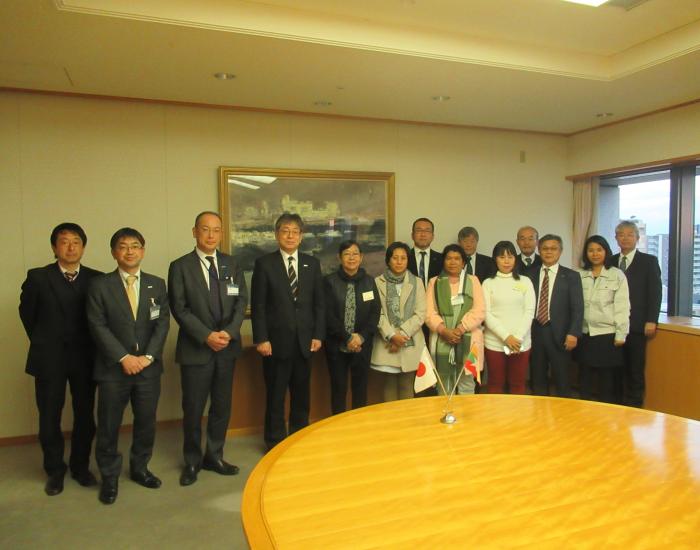
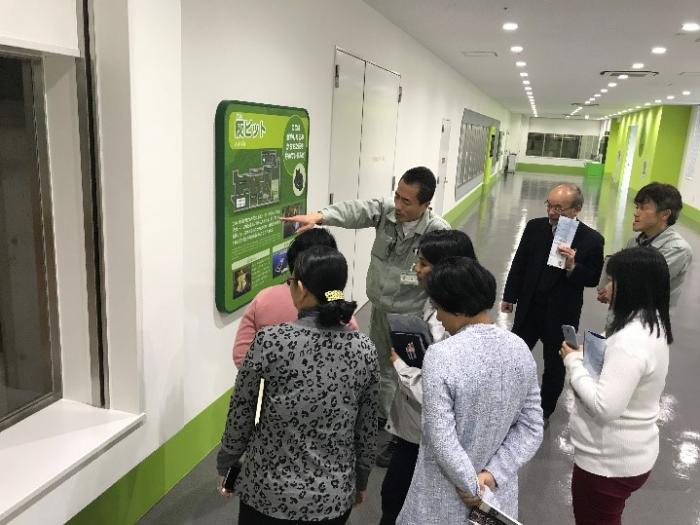
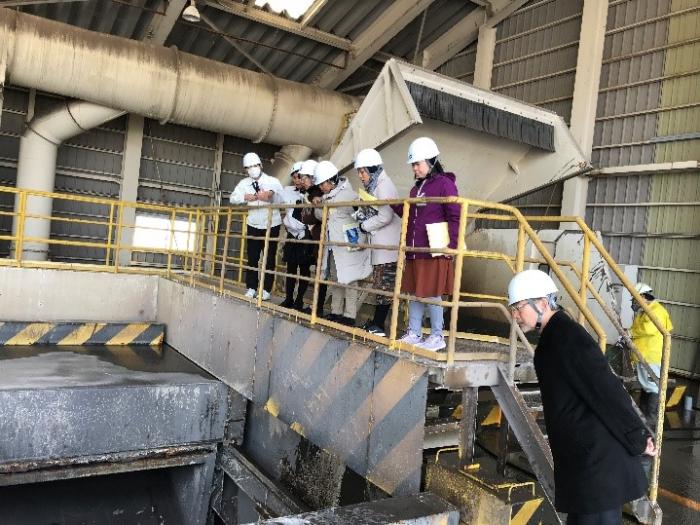
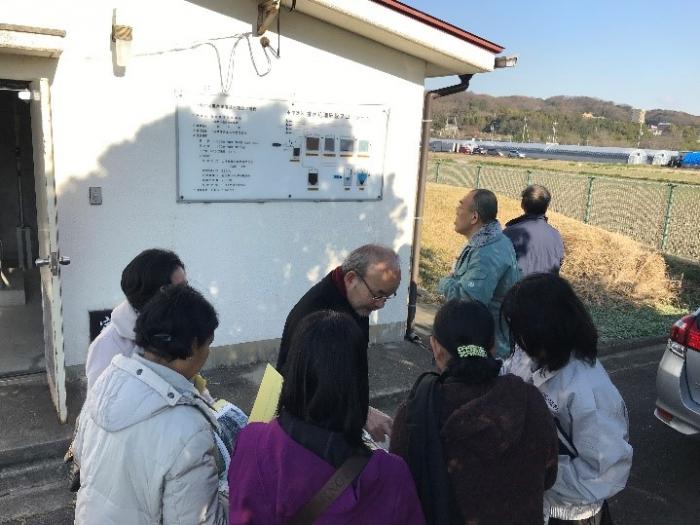
Can Tho City, Socialist Republic of Vietnam
In March 2019, a delegation headed by the chairman of the People’s Committee of Can Tho City visited Kobe to meet the city’s vice mayor and the vice governor of Hyogo Prefecture, and attended a business seminar and other events.
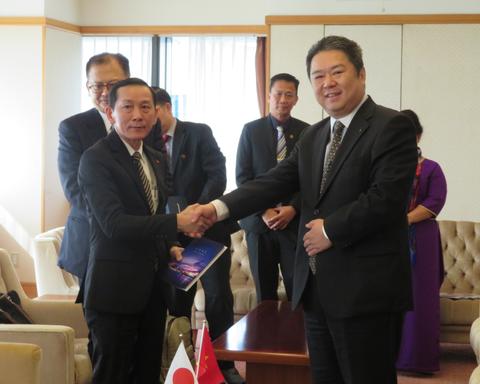
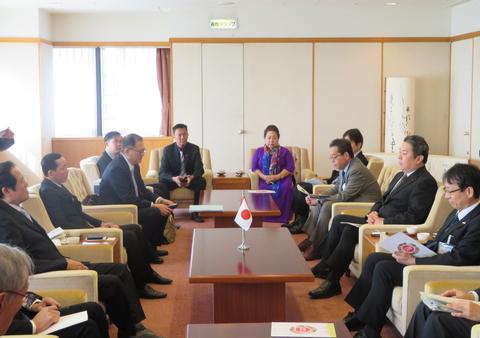
People’s Republic of Bangladesh
City corporations in Bangladesh, whose cities are experiencing a rapid increase in population, are lagging behind in building urban infrastructure including roads and ditches. This is causing considerable traffic congestion and various urban environmental problems, which are hampering economic activity in the cities. This is why JICA is implementing an Inclusive City Governance Project in Bangladesh.
Under this project, in February 2019, at the request of JICA, Kobe Housing & Urban Development Corporation offered a capacity development training program for government officials from Bangladesh. During this program, a delegation led by the head of the planning unit at the Local Government Engineering Department (LGED) met the director general of the International Technical Cooperation Headquarters in Kobe and visited Seishin New Town, the Port of Kobe and other places in the city.
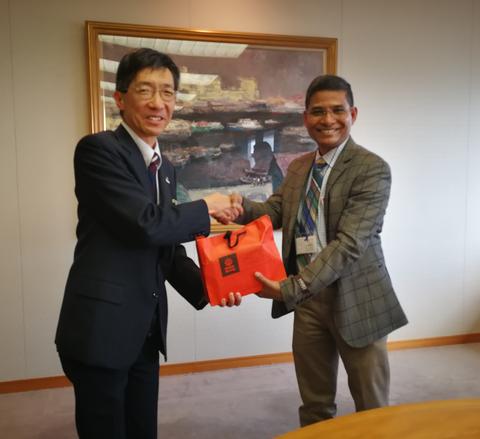
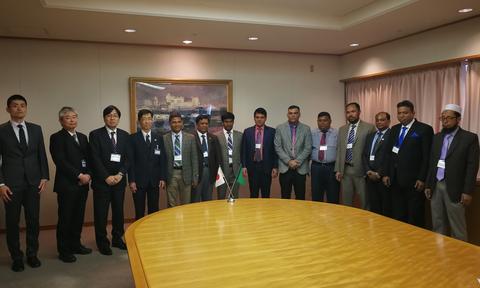
Urban Planning in the Yangon Region, Republic of the Union of Myanmar
(1)Outline
In August 2018, a business proposal from Okamura Co., Ltd. was selected through JICA’s “Support for Japanese Small and Medium-sized Enterprises (SMEs) Overseas Business Development - Project Feasibility Survey (First of FY2018)”. Based in Kobe’s Hyogo ward, the Okamura Co., Ltd. had previously signed a bilateral agreement with Kobe City towards overseas development of water infrastructure from 2013.
(Reference) About the Support for Japanese Small and Medium-sized Enterprises (SMEs) Overseas Business Development program
JICA tackles problem solving for developing countries by examining the possibilities of business ideas that make use of ODA projects as well as the technologies, products, and know-how of Japanese SMEs, and then conducts Project Feasibility Surveys for supporting the formulation of business models. For these surveys, JICA makes one or two public announcements a year for project proposals from SMEs and contracts the most feasible projects, which are funded by JICA and moved up to the next stage.

(2)Proposal
In September 2016, the Yangon Chief Minister was invited to Kobe to observe urban development practices in Kobe. This proposal, the “Feasibility survey for the introduction of advanced septic tanks to hospitals and markets for resolving the water sanitation issues of the poor regions in southern Yangon”, was put forward to help realize the Chief Minister’s goals of poverty reduction and rectification of the socioeconomic gap in the Yangon region.
This survey examined the feasibility of introducing septic tanks developed in Japan to hospitals, markets, and other public facilities in the southern Yangon region, as part of reform measures to address the water sanitation problems from flooding disasters brought about by frequent cyclones.
(3)Further Development
The Okamura Co., Ltd., with support from Kobe city and the Kobe Housing & Urban Development Corporation, performed a series of five verification tests after 2017.
Next, as part of an official JICA project, specific surveys will be conducted to inspect and analyze problems that influence domestic wastewater conditions and the local water cycle, narrow down the target project area, examine the feasibility of introducing the Okamura Co., Ltd.’s septic tanks, and create business deployment plans for development policies and private-sector businesses in future ODA projects. Kobe City and other relevant organizations will also continue to cooperate with and support these surveys.
Metropolitan Cebu, Philippines
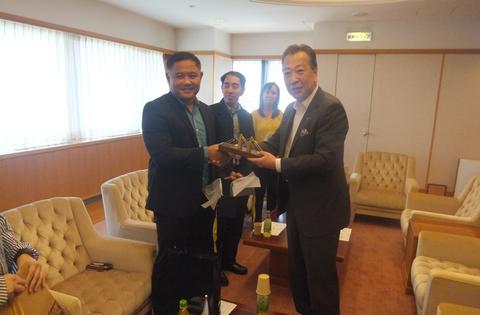
Metropolitan Cebu, the second largest metropolitan area in the Philippines, has manifested the issue of traffic congestion that accompanies rapid population growth and urban development. In response, JICA has implemented the “Master Plan Study on Urban Transport System Development in Metropolitan Cebu”.
As part of the project, Kobe conducted training with people involved with the Philippine government through the Kobe Housing & Urban Development Corporation. In May 2018, the Mandaue Vice Mayor was invited to lead the first delegation to Kobe. In addition to making a courtesy call to the city mayor, the delegation was also shown Seishin New Town, the Port of Kobe, and other places.
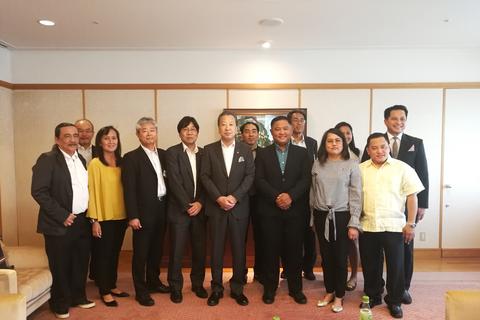
Lilongwe city, Republic of Malawi
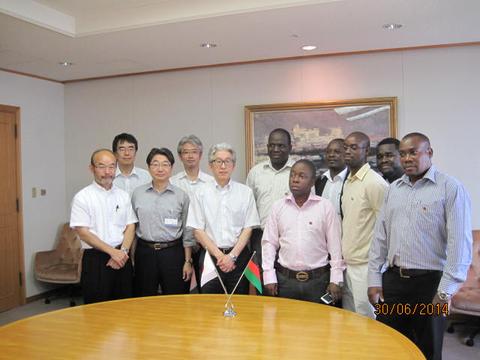
Traffic congestion, declining living conditions, and other city problems that accompany rapid population growth have manifested in Lilongwe, the capital city of the Republic of Malawi. Through an official request from JICA, from 2012 to 2015 Kobe dispatched specialists in fostering human resources for city planning and development as well as provided training in Japan through the Kobe Housing & Urban Development Corporation.
Yangon metropolitan city, Republic of the Union of Myanmar
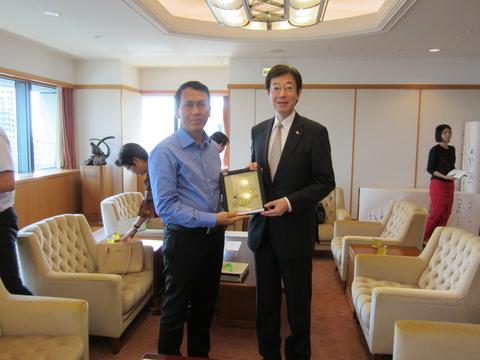
After receiving an official request from the Ministry of Land, Infrastructure, Transport and Tourism, the Kobe City government has provided advice and other support in such areas as master city planning, post-planning policy regulations, and government administration.
In September 2016, the Yangon Chief Minister was invited to lead their first delegation to Kobe. In addition to making a courtesy call to the city mayor, the delegation was also shown New Seishin Town, the Port of Kobe, and other places in the city.
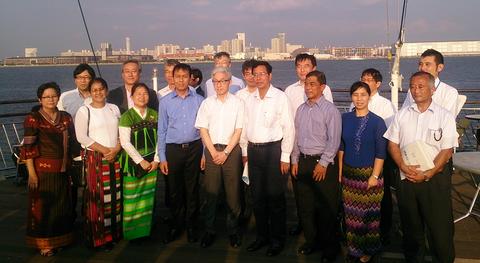
Kien Giang Province, Socialist Republic of Vietnam
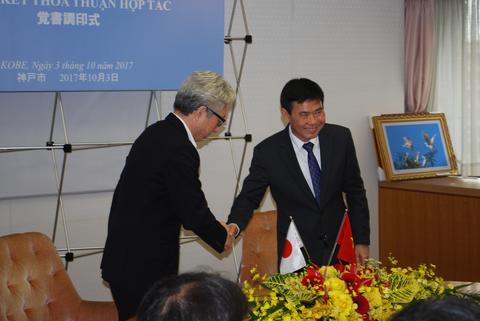
In 2011, the Kobe City government signed a memorandum with the Kien Giang People’s Committee regarding exchange and mutual cooperation in the fields of environment, water and sewage, through which Kobe provided technological support.
After the first amendment to the memorandum in 2014, it was combined with a second revised memorandum. In October 2017, the Kien Giang Province leaders were invited to Kobe for the signing ceremony.
Dong Nai Province,Socialist Republic of Vietnam
In 2024, the Kobe City government signed a memorandum with the Dong Nai People’s Committee regarding exchange and mutual cooperation in the fields of environment, energy, sewage, through which Kobe provided technological support.
In September 2024, the Dong Nai Province leaders were invited to Kobe for the signing ceremony.
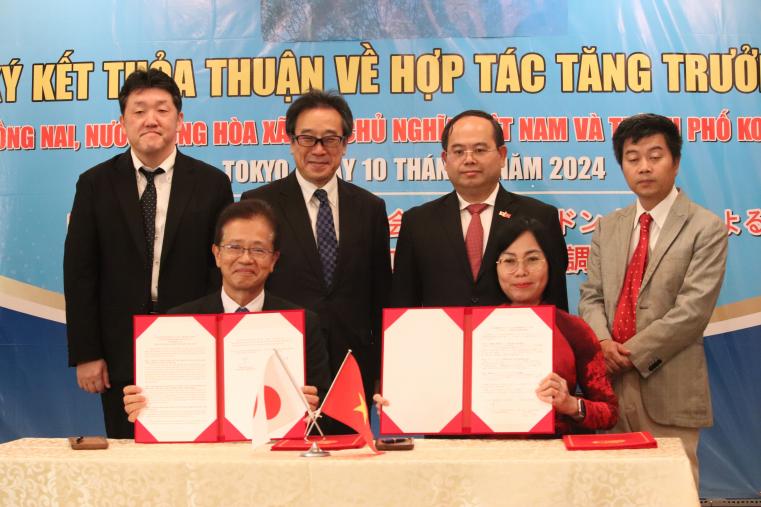
Structure and Liaising of Technical Cooperation
On October 1, 2017, Kobe established the “International Technical Cooperation Headquarters”, a cross-sectional organizational structure that combines different government departments.
The Urban Planning Bureau would act as a general liaison in regards to the Kobe City government’s technological support of developing countries, and all departments as one would respond to the needs of any national or regional government that requires support.
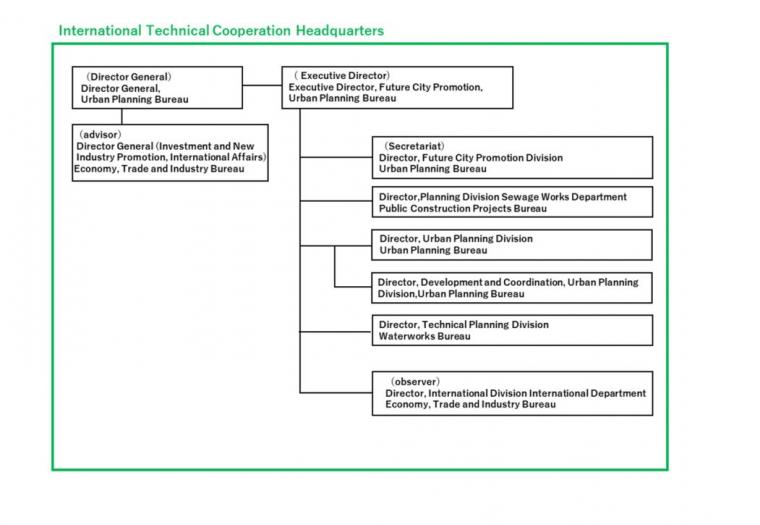
For any inquiries in relation to the Kobe City government’s international technology cooperation and support:
Kobe City International Technical Cooperation Headquarters
(Future City Promotion Division,Urban Planning Bureau)
TEL +81-078-595-6685 FAX 078-595-6690
E-mail chiikiseisaku@office.city.kobe.lg.jp
よく見られているページ
- 最寄駅から始まる、豊かな暮らし「モヨリノ」
- 神戸名谷ワークラボAOZORA
- 神戸市営地下鉄海岸線沿線地域の活性化
- ポートアイランド・リボーンプロジェクト
- 近畿圏整備法
- Efforts in Providing Overseas Technical Support in Kobe City (Kobe City International Technical Cooperation Headquarters)
- 神戸市における海外向け技術支援の取り組み
- 空飛ぶクルマ社会実装促進事業
- 伊川谷
- 谷上
- ポートアイランド方面バス
- 共通乗車証社会実験等のピークシフト施策
- ポートライナーの輸送力増強・施設改良
- マリンエアシャトル(神戸空港方面バス)
- 中央市民病院行き路線バスの無料社会実験
- マリンエアシャトル時刻表(神姫バス)
- ミュージアムロード アイデアコンペ
- 近畿圏整備法における政策区域
